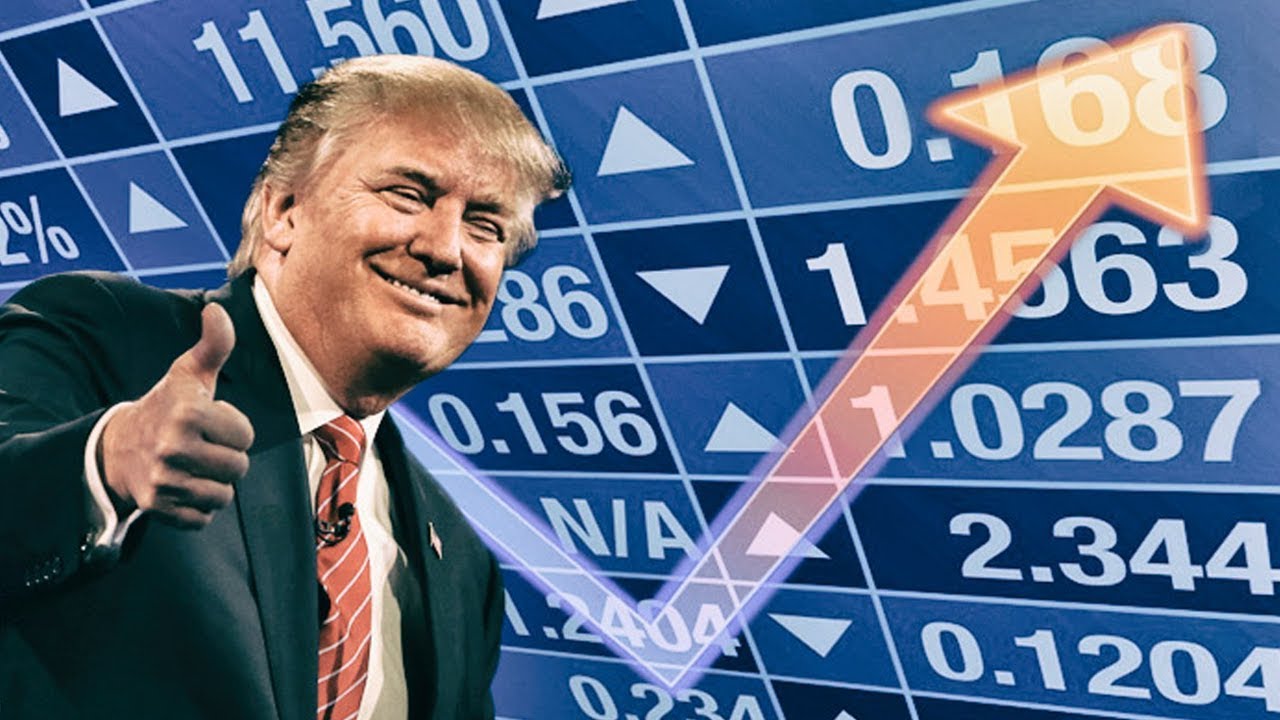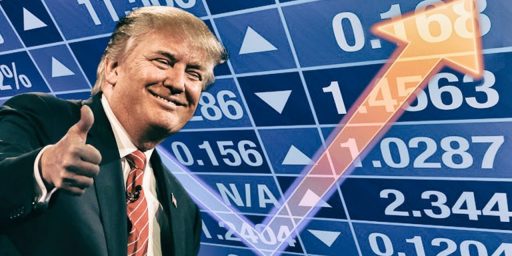Why Republicans Probably Won’t Benefit From The Economy In 2020
While the economy is likely to remain at its current levels for the next year, that probably won't help Trump and the GOP much.

In an ordinary election, Republicans ought to find themselves in a pretty good position heading into 2020. They control the majority of state legislatures and Governor’s mansions, the United States Senate, and the Presidency. In the last eight elections in which the incumbent President was running for re-election, that incumbent won five times, and the number increases to six if you count the election of George H.W Bush as essentially expressing the desire for a third term of the Reagan/Bush era, that number increases to six. Additionally, the economy is currently in good albeit not spectacular shape and current forecasting does not see a recession occurring between now and the 2020 election.
This last point is important because, generally speaking, the state of the economy has been seen as the best predictor of the outcome of an election. This is a fact that has been repeatedly reinforced by post-election polling that has shown that the state of the economy has generally been the most important issue on the mind of voters, with their own personal economic situation being close behind. As Ben Casselman and Jim Tankersley at The New York Times note, however, President Trump may not see much of an economy-related bump in 2020 and the main reason for that is because how people are viewing the economy right now is largely dependent on how they feel about President Trump:
Americans’ views of the economy have become so hardened along partisan lines that the economy may matter less in next year’s presidential election than in the past.
Both major political parties have emphasized the economy in the early stages of the campaign. Republicans hope that a rock-bottom unemployment rate and rising wages will cause voters to stick with President Trump despite the various scandals enveloping his administration. Democrats believe high levels of income inequality and fears of a looming recession will make voters willing to consider a new direction.
Surveys suggest that those arguments are resonating — but only with voters already inclined to agree with them. Republicans consistently say the economy is doing well and give Mr. Trump strong marks for his stewardship. Democrats are much more pessimistic, and, to the extent they do believe the economy is strong, doubt that Mr. Trump deserves much credit.
And notably, neither group’s views have shifted much in response to changing economic conditions. Earlier this month, for example, 71 percent of Republicans said they expected business conditions to be “very” or “somewhat” good over the next year, compared with just 15 percent of Democrats who said so, according to a survey conducted for The New York Times by the online research platform SurveyMonkey. Those numbers are virtually unchanged from two years ago, before trade tensions and other factors began to drag down the manufacturing sector and weaken the broader economy.
Economic conditions have historically been among the best predictors of presidential elections, and models based on those patterns suggest that Mr. Trump would be favored to win re-election if the economy remains more or less on its current path through Election Day.
But it is unclear whether historical lessons hold in an era of heightened partisanship.
“The predictive power of the economy is weakening as polarization increases,” said Amber Wichowsky, a political scientist at Marquette University who has studied how economic issues affect voters’ political views. “Partisans have a strong desire to interpret the economy in a way that benefits their ‘team.'”
The authors then go on to cite interviews with people around the country, both supporters and non-supporters of the President, about their views about the state of the economy. Nearly universally, the clear takeaway from those interviews, and from the poll generally, is that Trump supporters are far more likely to believe that the economy is doing well while those who oppose the President are more likely to see signs that the economy isn’t doing nearly as well as the Administration and its supporters claim.
We saw two examples of that just this week, which has seen the release of key economic data such as a sub-par Gross Domestic Product report on Wednesday, an unimpressive jobs report this morning and the subsequent report of the ISM Manufacturing Index that shows the manufacturing recession entering its third month. Taken together, all three of these are clear examples of the fact that the economy is at the very least slowing down. Despite this, President Trump continues to claim that the current economy is the strongest ever and to tout numbers that he cited as examples of failure when they were released under President Obama. One example of that can be seen in the Gross Domestic Product report, which came in at an annualized growth rate of 1.9%. Here’s what he said when we got a similar number in 2012:
And here’s what he said this morning after the jobs report was released:
This was for an employment reporter that came in at 128,000 new jobs, which was above expectations but still not very impressive. It certainly was not a “blowout,” and the most that the General Motors strike did was take about 50,000 jobs off the table for the month. Where he gets 303,000 from is unknown, but it certainly isn’t anywhere close to a monthly job growth figure that we’ve actually seen during the Trump Presidency. Despite this, Trump’s supporters will believe him when he claims that the employment report and the economy are “booming” even when the evidence to the contrary is all around us.
What all of this means is that the people most likely to believe the economy is doing well are the same people who are likely to vote for Donald Trump and to be among his most strident supporters. These people will believe whatever they are told by Trump despite what the statistics, and the declines in manufacturing and retail in particular, are telling us about the short to medium-term future of the economy. This means that it is harder to look at the economy as an indicator of where voters might head-on election than it used to be and it suggests that the state of the economy is unlikely to help Trump and the Republicans very much because they already have the support of those who believe the foolish lies that Trump has created an economic miracle where one clearly does not exist.





Yeah, but no.
The division is not ideological.
The division is between fact and fiction.
The division is between the real world and a cult of personality awash in lies.
At this point I hope someone (John Oliver!) buys ad time on Fox that is basically a somber announcer announcing our current growth on voice-over, with that Trump tweet (sans timestamp) on the screen.
It’s about as honest as most political ads, and might actually get through to his followers who aren’t strong on facts anyway.
Of course it’ll help them. If the economy collapses, they’re toast. The fact that 2020 is competitive at all depends entirely on the economy remaining at least okay.
OT, but O’Rourke has ended his campaign.
Trump promised 6% growth.
And a wall.
That Mexico would pay for.
The reason that Trump will not accrue any benefit is that even the fanbois knew he was flat-out bull shitting.
They did not desire stable economic growth and prudent governance.
They explicitly voted for chaos and disruption. They’re happy that Trump insults NATO and our longstanding allies.
If that harms us as a nation, but strokes their ideology and partisan identity, then so be it. One day a hard rain is going to come, they say. They actually want a hard rain to come.
@Kylopod: You need not have a collapse. Recession, even hitting only certain segments of the economy.
The analysis however is correct, Trump only is treading water with a decent economy. Recession opens the ballast doors relative to election margins as you all only need about 5% of the vote in the key marginal states to flip away for an election disaster for Trump (and by extension, Trump adjacent Republicans).
It’s in the end a margins analysis. Analyzing the core base is besides the point. It’s the margins that count, and specifically the margins in the geographies where the winning percentages are within about 5% of the overall vote. Flips on margins, modest discouragement (abstention) on the less bought-in margin of the core base and getting the less-voting segments of the population, that are by political structure not pro Trump, to vote. Five percent movement. Not conversion of his base.
Great comment made in a column over at The Guardian:
(The article is about the band of believers still huddled around Nigel Farage, enthusiastic to pay 100 pound fees for a chance to run as a Brexit Party candidate. Given that The Brexit Party still isn’t organised as an actual political party and that Nigel Farage has power over everything, I’m just waiting for the point at which Nigel grabs the loot and scampers off to America, complaining about How No One Appreciates His Genius.)
@grumpy realist:
Farage will scamper to South Africa.
@grumpy realist:
Yep. Politicians lie because the people demand it.